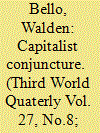|
|
|
Sort Order |
|
|
|
Items / Page
|
|
|
|
|
|
|
| Srl | Item |
| 1 |
ID:
075643


|
|
|
|
|
| Publication |
2006.
|
| Summary/Abstract |
This article argues that the key crisis that has overtaken today's global economy is the classical capitalist crisis of over-accumulation. Reaganism and structural adjustment were efforts to overcome this crisis in the 1980s, with little success, followed by globalisation in the 1990s. The Clinton administration embraced globalisation as the 'Grand Strategy' of the USA, its two key prongs being the accelerated integration of markets and production by transnational corporations and the creation of a multilateral system of global governance, the pillars of which were the World Trade Organization, the International Monetary Fund and the World Bank. The goal of creating a functionally integrated global economy, however, stalled, and the multilateral system began to unravel, thanks among other things to the multiple crises created by the globalisation of finance, which was the main trend of the period. In response partly to these crises, partly to increasing competition with traditionally subservient centre economies, and partly to political resistance in the South, Washington under the Bush administration has retreated from the globalist project, adopting a nationalist strategy consisting of disciplining the South through unilateralist military adventures, reverting to methods of primitive accumulation in exploiting the developing world, and making other centre economies bear the brunt of global adjustments necessitated by the crisis of over-accumulation.
|
|
|
|
|
|
|
|
|
|
|
|
|
|
|
|
| 2 |
ID:
075647


|
|
|
|
|
| Publication |
2006.
|
| Summary/Abstract |
While the validity of categories like 'First' and 'Third' World or 'North' and 'South' has been increasingly questioned, there have been few attempts to consider how learning between North and South might be conceived. Drawing on a range of perspectives from development and postcolonial scholarship, this paper argues for the creative possibility of learning between different contexts. This involves a conceptualisation of learning that is at once ethical and indirect: ethical because it transcends a liberal integration of subaltern knowledge, and indirect because it transcends a rationalist tendency to limit learning to direct knowledge transfer between places perceived as 'similar'. This challenge requires a consistent interrogation of the epistemic and institutional basis and implications of the North - South divide, and an insistence on developing progressive conceptions of learning.
|
|
|
|
|
|
|
|
|
|
|
|
|
|
|
|
| 3 |
ID:
075644


|
|
|
|
|
| Publication |
2006.
|
| Summary/Abstract |
The analytical nucleus of this paper is formed through a consideration of some primary aspects of the interconnections between a resurgent imperialism and a contested terrain of democratic politics. There are three sections: in the first part an exploratory examination of significant elements of the contemporary literature on imperialism is developed. This includes a discussion of the relationality of imperial power, the differentiation of imperiality from imperialism and the neglected importance of the agents of imperialist power. The second section attempts to tease out some of the specificities of the USA as an imperial democracy set within a broad context of North - South relations. This leads into a final discussion of the geopolitics of democratisation. The paper is an exploratory treatment of certain features of an extensive conceptual and political terrain formed by the intersections between imperialism and democratic politics.
|
|
|
|
|
|
|
|
|
|
|
|
|
|
|
|
| 4 |
ID:
075646


|
|
|
|
|
| Publication |
2006.
|
| Summary/Abstract |
The policy-making context in the 'South' would seem to have changed in recent years, potentially opening space for alternative voices. The international financial institutions no longer overtly insist on policy content. The 'locally owned' Poverty Reduction Strategy Paper (prsp) has become the main vehicle for policy. Many have argued prsps represent a 'remorphing' of neoliberalism or the Washington Consensus as practised by the international financial institutions for much of the 1980s and 1990s. However, although much research on prsps has focused on the process of prsp production and the extent of participation, the outcome of the prsp process-the actual prsp-and its content has received relatively limited attention. This article is an exploratory piece. Taking the content of 50 prsps the following question is posed: has the prsp process opened space for something new, Stiglitz's post-Washington Consensus, or for the reproduction of the former Washington Consensus?
|
|
|
|
|
|
|
|
|
|
|
|
|
|
|
|
| 5 |
ID:
075645


|
|
|
|
|
| Publication |
2006.
|
| Summary/Abstract |
In 1985 David Booth wrote a seminal article in which he argued that development theory, mostly Marxist but also modernisation theory, was out of touch with reality, incapable of generating viable policy, and riven with meta-theoretical errors. He recommended a return to empirical case studies, the comparative method, and an awareness of the problems of functionalist and essentialist argument. In the ensuing decade a further range of solutions was offered to bail development theory out of trouble: micro-theory, participatory action research, postmodernism, post-development theory, postcolonialism. Twenty years later the dominance of Marxist and neo-Marxist theories has been replaced by an equally pervasive hegemony of Foucauldian discourse. In signaling the presence of a new impasse, there is much talk of 'the poverty of post-development'. The intriguing question to ask is: what can development theorists and Third World intellectuals learn about themselves in this constant refrain?
|
|
|
|
|
|
|
|
|
|
|
|
|
|
|
|
| 6 |
ID:
075648


|
|
|
|
|
| Publication |
2006.
|
| Summary/Abstract |
It is widely assumed that the School of the Americas (soa), a US training school for Latin American military forces, advocated repression during the Cold War. To demonstrate this, previous research has tended to focus on establishing correlations between training and specific human rights abuses by individuals trained at soa. A stronger case can be made through detailed analysis of soa training manuals within the context of US foreign policy towards the global South. Public protest led to soa's re-launch in 2001. Most protestors assume that this change was purely cosmetic. Based on extensive fieldwork, I argue that changes were genuine, and the School now has a commendable human rights programme. This is in contrast to most US military training, domestic and foreign, which remains secretive and devoid of adequate human rights instruction. The paper argues that a resurgence of support for repression since 9/11 undermines progress at the School.
|
|
|
|
|
|
|
|
|
|
|
|
|
|
|
|
| 7 |
ID:
075650


|
|
|
|
|
| Publication |
2006.
|
| Summary/Abstract |
The issue of gender inequality is an acute problem in countries where women's lives are governed by laws, and configured by customs and traditions, said to derive from Islam. In the second half of the 20th century, two Muslim feminist paradigms have emerged in response to this malaise. Islamic feminists aim to establish women's rights within the Islamic framework by re-interpreting Islam's holy sources. In contrast, secular feminists challenge the particularistic nature of the Islamic framework and advocate the application of a set of standard universal rights for Muslim and non-Muslim women. This article focuses on the writings of the Moroccan feminist Fatima Mernissi, tracing her evolution from advocating secular reconstruction of Muslim societies to a position that resembles Islamic reformism.
|
|
|
|
|
|
|
|
|
|
|
|
|
|
|
|
|
|
|
|
|